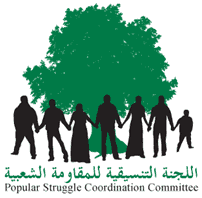-
Critically injured Mustafa Tamimi of Nabi Saleh dies of his wounds
9 December 2011 | Popular Struggle Coordination Committee Mustafa Tamimi, who was fatally injured yesterday during a demonstration in the West Bank village of Nabi Saleh passed away earlier today. Tamimi was hit in the face by a tear–gas projectile shot directly at him, from only a few feet away. Mustafa Tamimi, a 28 year […]
-
In Exile: Families relate stories of prisoner exiles
by Alistair George 10 December 2011 | International Solidarity Movement, West Bank Although Palestinian prisoners endure harsh conditions in Israeli prisons, including and physical and psychological torture, their families are also severely punished through the policies of the Israeli authorities. The prisoner release deal brokered between Hamas and the Israeli authorities saw the release of […]
-
Military teargases Kufr Qaddoum following nightly raids and arrests
by Alistair George 9 December 2011 | International Solidarity Movement, West Bank The Israeli military fired tear gas canisters directly at demonstrators in Kufr Qaddoum today in an aggressive response to the weekly protest against the closure of the main road linking the village with Nablus. Many people suffered from severe gas inhalation. After midday […]
Action Alert An Nabi Saleh Apartheid Wall Arrests BDS Bethlehem Bil'in Cast Lead Demonstration Denial of Entry Ethnic Cleansing Farmers Gaza Global Actions Hebron House Demolition International law Israeli Army Jerusalem Live Ammunition Nablus Ni'lin Prisoner Ramallah Rubber-coated steel bullets Settlement Settlers Settler violence Tear-Gas Canister Video


